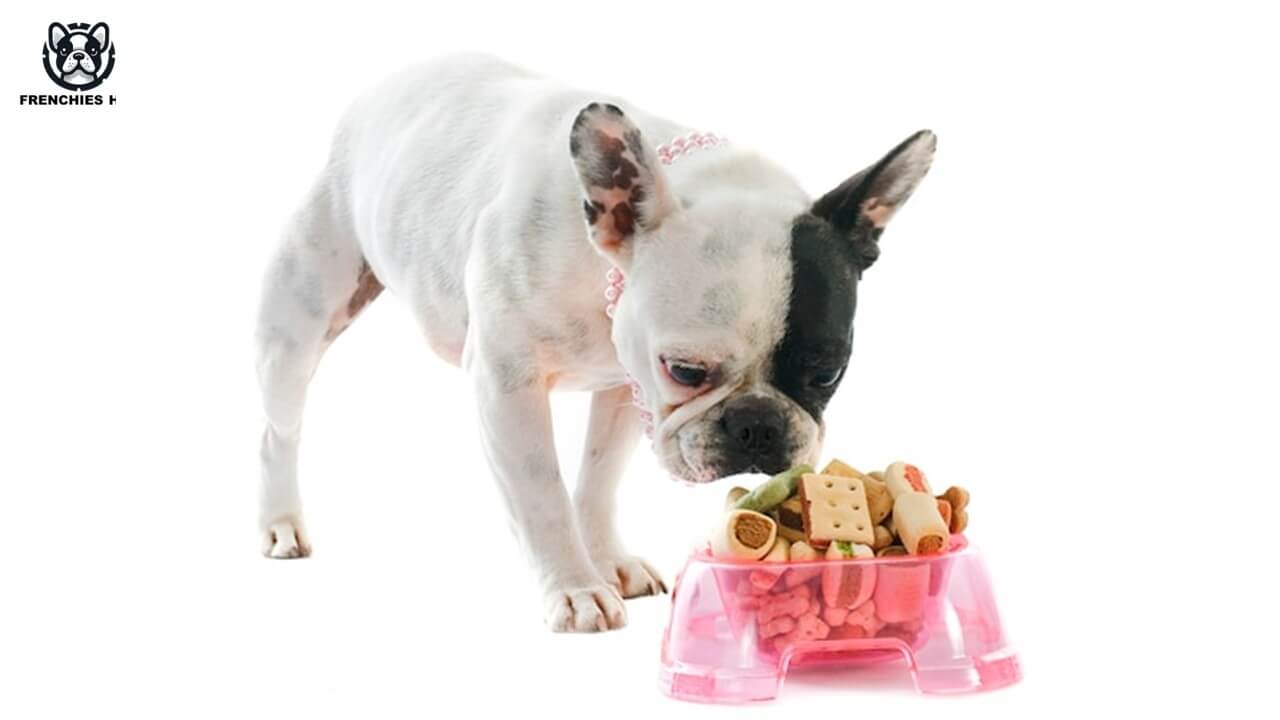As a French Bulldog owner, one of the most common questions you might ask is, “How much should I feed my French Bulldog?” This is followed closely by “How often should I feed my French Bulldog?” These queries revolve around not just the volume of food but also how frequently it should be given. Determining the right amount can be difficult to calculate precisely without understanding some key aspects of your furry friend’s needs.
Frenchies, as they are affectionately known, typically weigh anywhere from 16lbs to 28-30lbs. Despite their manageable size, they don’t need much exercise and are known to be quite lazy, affecting their dietary needs. An effective way to get an exact number of the daily caloric intake is by using a calculator like Merrick, which factors in the French Bulldog’s weight, age, and activity level.
Most French Bulldogs should be fed approximately 25-30 calories per pound of body weight per day. This intake should ideally be split into two to three meals to support better digestion and metabolic health. For example, a typical, healthy French Bulldog consuming this calorie count might look like a 16lb French Bulldog that doesn’t exercise a lot, receiving about 400-480 calories per day.
However, for a bigger, lazier French Bulldog around 28lbs, the caloric needs might rise to about 700-800 calories per day. Thus, the average adult French Bulldog should ideally get anywhere from 550 to 750 calories per day, depending on their specific health and lifestyle.
It’s essential to regularly weigh and observe your French Bulldog every few weeks to make sure they are not over or underweight. You shouldn’t be able to see your dog’s ribs if they are at a healthy weight. Moreover, since each dog’s needs can vary significantly, it’s crucial to always consult your veterinarian regarding these numbers. Remember, while I share this advice based on extensive experience with French Bulldogs, I do not claim to be a canine nutritionist.
Feeding Your French Bulldog: How Much is Just Right?
When it comes to feeding your French Bulldog, knowing the proper amount of food daily is crucial. This critical aspect of care ensures your pup maintains a healthy weight, neither becoming overweight nor underweight. French Bulldogs can vary significantly in activity level, from hyperactive youngsters to lazy couch potatoes, impacting their dietary needs.
To begin, using a calculator to obtain an exact number of calories tailored to your dog’s weight, age, and activity level is invaluable. This calorie number should then be cross-referenced with the manufacturer’s nutritional information, typically found online or on the bag or box of dog food.
- Caloric Needs by Bulldog Type: For a mean weight of 25 pounds, which is average for French Bulldogs, caloric needs can vary:
- Older French Bulldogs: Typically require between 470-400 calories per day due to their less active lifestyle.
- Typical Adult French Bulldog: Needs about 550-600 calories per day to sustain their everyday activities.
- Highly active, adult French Bulldogs: These energetic dogs need more fuel, approximately 750-825 calories per day.
Feeding Schedule and Consultation
It’s important to maintain a consistent feeding schedule, offering meals first thing in the morning (around 8:00 a.m.) and roughly 10-12 hours later (around 6:00 p.m.). Always consult a vet about your French Bulldog’s food intake and weight to ensure any diet adjustments are safe and beneficial.
Remember, the right amount and frequency of feeding are as important as the quality of the food itself. Do not slack off in managing this, as it is essential for your Frenchie’s health and happiness.
Note: While I provide this guidance based on personal experience and research, I do not claim to be a veterinarian. Always seek professional advice for your pet’s specific needs.
Feeding Guidelines for French Bulldog Puppies Aged 10-12 Weeks
When you first bring a French Bulldog puppy into your home, determining the right amount of food can be daunting. At the 10-12 weeks age, your Frenchie should have been weaned off their mother’s milk and switched to puppy food. This is a gradual process, often spanning several weeks, to ensure a smooth transition that caters to their high caloric and nutrient needs.
For a French Bulldog of this age, I recommend a total of 1.5 cups of puppy food per day, spread across 3 meals. Each meal should consist of about 1/2 cup, helping to maintain a healthy amount of energy and nutrients in your puppy’s belly. Spreading out the meals helps to minimize the peaks and decreases in blood sugar levels that could affect your puppy’s energy levels and overall health.
It’s important to continue this feeding schedule for about 6 months. While it might be tempting to switch to twice daily feeding for convenience, I would encourage you to sustain feeding 3 times per day. This approach tends to be significantly better for your companion’s well-being, helping to avoid issues like gastric dilatation volvulus, which can sometimes occur from feeding only twice daily.
Feeding smaller meals 3 to 4 times daily is not just a routine but a commitment to ensuring your French Bulldog’s old age is as vibrant as their youth.
Feeding Guidelines for French Bulldog Puppies Aged 6-9 Months
By this stage in their development, your French Bulldog should be well into a strict routine that supports their growth and prepares them for the rest of their lives. During the period from around 6 months to 1 year of age, it is crucial to start feeding your pet very high-quality adult doggy food. This is the time when they transition from playful puppies to more settled young dogs, and their dietary needs become more consistent.
For French Bulldogs at this age, establishing and maintaining a regular feeding schedule ensures that they are comfortable and happy. Feeding should occur at the same time every single day, helping to instill a sense of security and routine. It’s important to make this a consistent practice every week, every year to keep your Frenchie in the best possible health.
While sticking to the advised body weight ratios, don’t hesitate to consult your vet if you’re unsure about the quantities or think your French Bulldog might be underweight. An adjustment as small as adding half a cup more to their daily intake can be made, gradually increasing to ~2.5 cups per day until their weight stabilizes. This careful monitoring ensures your Frenchie stays pleasantly tubby and happy, without becoming overweight.
Given their propensity to overeat, it’s vital to monitor how much your French Bulldog consumes, especially if they’re around other pets during meal times. Ensure they’re only eating their own food and not helping themselves to others’. If underweight, consider feeding them a bit more, around 2.5-3 cups per day or 30-40 calories per pound, split across three meals. This will help them reach a weight that’s well-within the normal range for the breed.
Always consult with your veterinarian if you have any concerns about your dog’s diet or weight. They can provide guidance tailored to your French Bulldog’s specific needs and ensure there are no underlying health issues. Such consultations are often quick, cheap, and sometimes even free, making it a small but crucial investment in your companion’s health and happiness. If efforts to manage their weight at home are unsuccessful, a vet visit is mandatory to rule out any other complications.
Managing Diet for an Overweight French Bulldogs
Overweight Frenchies can suffer from severe health problems, such as heart disease—a condition not unfamiliar to humans—as well as labored breathing and a lack of physical exercise. If you find your French Bulldog is overweight, it’s crucial to monitor how much you are feeding them. Ensure they are not eating another pet’s food, as this can contribute to their excessive weight gain.
To help your Frenchie return to a healthy weight, you may need to reduce their daily food intake by half a cup. Additionally, increase their water intake and incorporate regular evening walks when it’s cool outside. It’s important to remember to never take your French Bulldog out to play in sweltering heat, as they can die from overheating due to their brachycephalic nature. This careful approach to diet and exercise will ensure your pet regains and maintains a healthy lifestyle.
Managing Diet for an Older French Bulldogs
As French Bulldogs age, their dietary needs adjust. Older French Bulldogs generally require less food than their younger, more energetic counterparts due to a natural decrease in activity levels and metabolic rate. For a senior dog that’s within the nominal weight range or perhaps even below, a guideline of 20-25 calories per pound is a good starting point.
It’s important not to restrict food too much, especially if your dog appears underweight or hungry. Offering 1-1.5 cups of food in the morning and the same amount at night allows them to have consistent meal portions they can rely on throughout the day. If they don’t finish their meal, leaving the food in the bowl for a midday snack is perfectly acceptable.
Be vigilant about your dog’s weight; if you notice an increase, consider reducing their daily food intake by 5-10 calories per pound until they return to a healthier weight. It’s crucial to understand that while some might suggest feeding up to 800-1000 calories per day for a French Bulldog in the 40lbs range, this is typically too much for these chunky and lazy pets who don’t expend a lot of energy.
In the golden years of their lives, when French Bulldogs become less active and their metabolism slows, it’s advisable to adjust their intake to about 15-20 calories per pound. Keep a close eye on their condition; if they seem thinner than usual, incrementally increase their calorie allowance by about 5 calories per pound until their weight stabilizes.
Additionally, if needed, you can supplement an extra quarter of a cup of food per meal temporarily to ensure they’re receiving enough nourishment to maintain a healthy weight. Always use reliable resources and tools to gauge the correct food amounts and consult a vet regularly to adapt their diet as needed.

